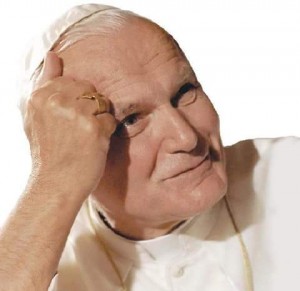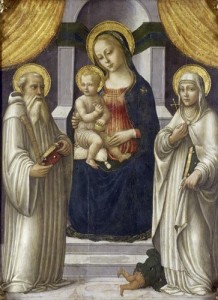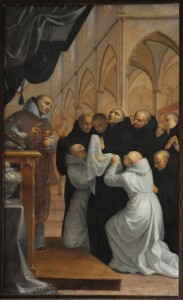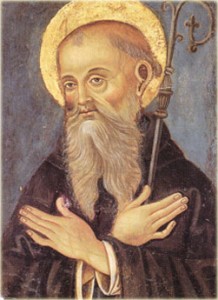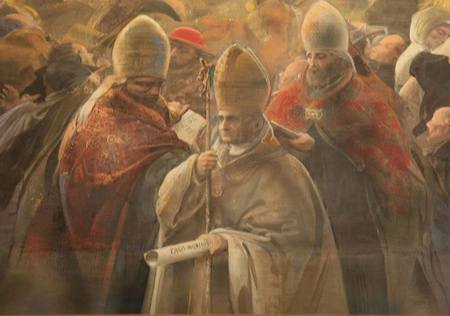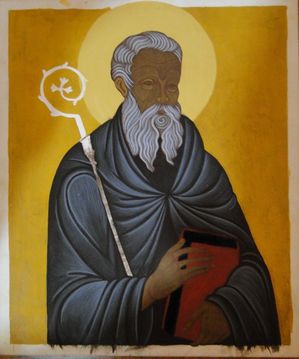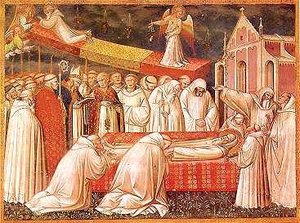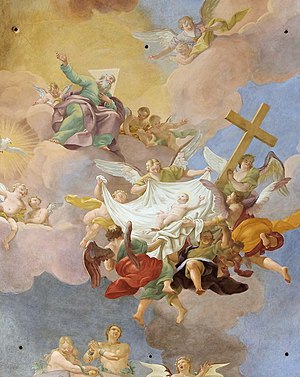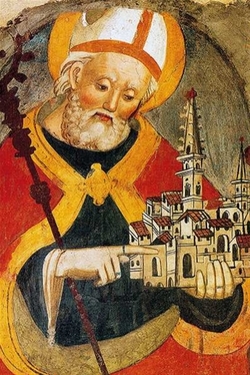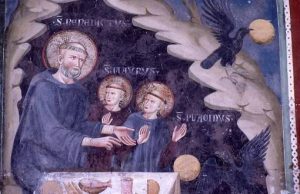 At the Introit, we sing today on the feast of Saint Benedict:
At the Introit, we sing today on the feast of Saint Benedict:
Let us all rejoice in the Lord, celebrating the feast in honor of Benedict, in whose happy solemnity. The angels rejoice and praise the Son of God.
Great is the Lord and greatly to be praised In the city of our God, on his holy mountain. (Ps. 47:2)
Glory to the Father and to the Son and to the Holy Spirit As it was in the beginning, is now, and ever shall be, world without end. Amen.
In 2008, Pope Benedict XVI wrote this about this man of blessings:
The obedience of the disciple must correspond with the wisdom of the Abbot who, in the monastery, “is believed to hold the place of Christ” (2, 2; 63, 13). The figure of the Abbot, which is described above all in Chapter II of the Rule with a profile of spiritual beauty and demanding commitment, can be considered a self-portrait of Benedict, since, as St Gregory the Great wrote, “the holy man could not teach otherwise than as he himself lived” (cf. Dialogues II, 36). The Abbot must be at the same time a tender father and a strict teacher (cf. 2, 24), a true educator. Inflexible against vices, he is nevertheless called above all to imitate the tenderness of the Good Shepherd (27, 8), to “serve rather than to rule” (64, 8) in order “to show them all what is good and holy by his deeds more than by his words” and “illustrate the divine precepts by his example” (2, 12). To be able to decide responsibly, the Abbot must also be a person who listens to “the brethren’s views” (3, 2), because “the Lord often reveals to the youngest what is best” (3, 3). This provision makes a Rule written almost 15 centuries ago surprisingly modern! A man with public responsibility even in small circles must always be a man who can listen and learn from what he hears.
Benedict describes the Rule he wrote as “minimal, just an initial outline” (cf. 73, 8); in fact, however, he offers useful guidelines not only for monks but for all who seek guidance on their journey toward God. For its moderation, humanity and sober discernment between the essential and the secondary in spiritual life, his Rule has retained its illuminating power even to today. By proclaiming St Benedict Patron of Europe on 24 October 1964, Paul VI intended to recognize the marvellous work the Saint achieved with his Rule for the formation of the civilization and culture of Europe. Having recently emerged from a century that was deeply wounded by two World Wars and the collapse of the great ideologies, now revealed as tragic utopias, Europe today is in search of its own identity. Of course, in order to create new and lasting unity, political, economic and juridical instruments are important, but it is also necessary to awaken an ethical and spiritual renewal which draws on the Christian roots of the Continent, otherwise a new Europe cannot be built. Without this vital sap, man is exposed to the danger of succumbing to the ancient temptation of seeking to redeem himself by himself – a utopia which in different ways, in 20th-century Europe, as Pope John Paul II pointed out, has caused “a regression without precedent in the tormented history of humanity” (Address to the Pontifical Council for Culture, 12 January 1990). Today, in seeking true progress, let us also listen to the Rule of St Benedict as a guiding light on our journey. The great monk is still a true master at whose school we can learn to become proficient in true humanism.
